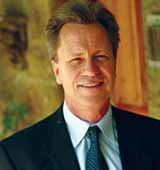|
Executive Interviews: Interview with John A Davis on Family Businesses
May 2007
-
By Dr. Nagendra V Chowdary
 John A Davis
John A Davis Senior Lecturer of Business Administration at Harvard Business School, the Faculty chair for Harvard Business School`s Executive Education Program 
You notice that conflicts are signature
statements in all the family-run
businesses. It happened recently in
India; between Ambani brothers; between
Bajaj brothers; and many more
in India and across the world. What,
according to you, are the prime reasons
for such conflicts? How to manage
family conflicts in the family business
system?
Conflicts among family members occur
for a variety of reasons like in any
kind of relationship. A conflict can
start as a simple disagreement over
goals or policies. Or it can arise from
different personalities or management
styles that one or more family
members find irritating.
|
|
Family
members usually endure these kinds
of differences and there are ways to
help defuse many kinds of family
conflict, such as having a board of
directors, certain family policies or
an external advisor to keep communication
flowing among family members.
The real goal in managing family
conflict is to maintain respect and
trust between family members.
When these are lost, it is very difficult
to regain them. How difficult it is to differentiate
between fairness and equality in family
business systems?
Extremely. Families in every culture
falsely believe that by distributing rewards
equally among close relatives,
the distribution will be perceived as
fair by the family members and it will
eliminate conflict among them. Sometimes
an equal distribution is fair;
sometimes it leads to conflict or reduces
the productivity of the business.
But families in business need to
see some inequality as fair. Let's now look at the governance
and leadership of the family business
system. Do you think a board would
better serve a family run business's
interests? Drawing from your extensive
research, do you think all the family-run businesses have boards?
After all, many opine, in a family run
business, it is that "one" person who
calls the shots. He discharges his responsibilities
perfunctorily and
therefore why have a non-performing
board? (Of course, this is never to
undermine the importance of a
board)
In prescribing tools for family business
governance, such as a board of
directors, always keep in mind the
goals we generally want to achieve
through governance: to provide a sensible
direction for the business, to allow
for decisiveness, to maintain the
trust and commitment of the owners,
and to offer effective oversight of management.
If you can achieve these
goals with no board of directors, then
don't use one. But usually a board of
directors (or a less formal board of advisors)
helps a lot to achieve the goals
of governance. What are the precautions that need
to be taken while designing an effective
(and efficient) family business
board and family governance structure?
Make sure stakeholders see a seat on
the board as a job and not as a birthright.
Select board members based on
their qualifications, train them and
compensate them for this work. Keep
your board focused largely on the big,
long term issues facing the company
and providing feedback to management.
Your managers should handle
the operating issues of the firm.
Family governance deserves
equal attention as business governance.
A little formalization of family
meetings, with agendas and perhaps
facilitators usually helps a family
stay focused on its big issues and
goals. Developing family policies
concerning family employment and
ownership, and for other sensitive issues,
helps enormously. Family governance
structures (the family council
and family assembly), are also
generally useful. In the traditional shareholder-run
companies (at least in most of the
Fortune 500 companies), the top
management grooms their successors.
Does this happen in family-run
businesses too? If it happens, how
the family members are nurtured for
taking on the higher order needs of
the family-run business? Who
should anchor such handholding
exercises?
It is unfair to characterize management
development as a handholding
exercise. In fact, it is a vital function
in the management of any enterprise
and is ignored at the peril of a company.
Especially if you want your
business to last into the next generation
it is necessary to invest in the
next generation. Family companies
vary widely in how well they do
this, as do the Fortune 500. We often
point to the Fortune 500 as paragons
of good management. They can be
but they often aren't.
1.
Family Owned Business Case Study
2. ICMR
Case Collection
3.
Case Study Volumes
|
